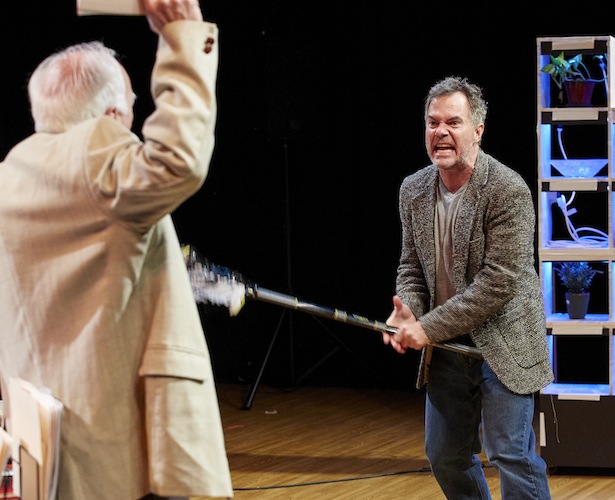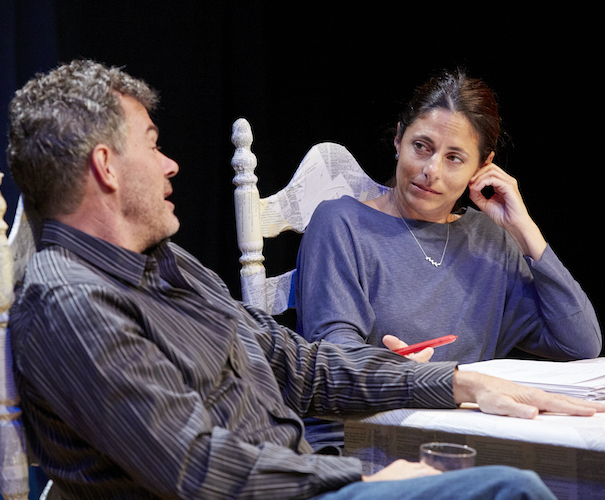Theater Review: “Academy Fight Song” — Cutting the Ivory Tower Down to Size
Satire exaggerates, but its details must ring true: here membership in academe is made up of those who never wanted to leave the comforts of college or those who see it as a launching pad for scoring big bucks.
Academy Fight Song by Andrew Clarke. Directed by Joe Antoun. Presented by CentaStage at the Calderwood Pavilion at the Boston Center for the Arts, 527 Tremont Street, Boston, MA through September 26.

Craig Mathers going after Richard Snee in a scene from “Academy Fight Song.” Photo: Joel Benjamin.
By Ian Thal
Davis (Craig Mathers) is an untenured English professor called into a meeting with his department chair, Greer (Richard Snee). Their sparring takes the form of banter between old friends, but the humor does not hide the tensions between them: Davis resents Greer’s climb up the ladder of the university’s hierarchy; Greer is frustrated that Davis, though a talented teacher, has yet to outgrow the antics of their younger days. What’s more, He has yet to live up to his responsibilities to the institution outside the classroom.
Davis’ contract is up for renewal and Greer wants a simple favor. The university is being offered a large sum of money by an alumnus who has had some recent and financially lucrative success in Hollywood. The guy is endowing a chair in a trendy new field of study in a subject yet to be determined. Greer is interested in recruiting one of Davis’ former protégées for the teaching position, a graphic novelist named Jonathan Foster (Tyler Catanella). What does Davis have to do? Convince Jonathan to accompany him to an academic conference and give a presentation. The catch? Jonathan is currently living in Davis’ former home with Liz (Tracy Oliverio), Davis’ ex-wife. He is her lover.
Davis doesn’t want to attend the “Emerging Fields of Study In The Humanities” conference, which his alma mater is hosting. Despite his reputation as the department’s bad boy, he is a stalwart defender of the canon, with a particular interest in Jacobean revenge-tragedies. He has absolutely nothing in common with any of the trendy scholars expected to be present. Furthermore, he looks disdainfully on the comic book medium where Jonathan has found success.
This is Andrew Clarke’s set-up for a fast-paced satire of contemporary academia. Fields like science and engineering have long enjoyed a cozy relationship with the corporate world: a tax-deductible donation to an institution of higher learning has proved to be a smart long-term investment in terms of patents and recruitment. The humanities have not proved to be as profitable: it usually chases after philanthropists who are content to have their name on a plaque somewhere on the institution’s grounds. Clarke’s script suggests that academia’s obsession with pop culture probably has as much to do with the bottom line as it does with charting an evolving culture. For example, in terms of theater and academia, why do so many graduates of university playwriting programs come up with scripts that resemble Hollywood fare? Is it because they have always wanted to write for television and film? Are their plays TV pilots in search of production money? Or are the plays this way because that’s what they’re taught to write? Could it be that faculty members are essentially in the networking business, hoping that a student or two will make it big, then hire their favorite teacher for the writers’ room? Or at least give the department a healthy endowment that secures their jobs until retirement?
Davis has entertained such thoughts of glory. He relishes the time a former student took him out to lunch and then optioned his book. Perhaps this is why he considers teaching a poetry workshop at a women’s’ prison to be the worst possible fate for entrepreneurship — no potential Hollywood big-shots in the offing. Am I being cynical? When I attended the Literary Managers and Dramaturgs of the Americas conference in 2014, I heard numerous attendees, many of whom were primarily employed as academics, citing acclaimed and popular series like Orange is the New Black, as examples that theater makers should follow. At least one panelist suggested that contributing to the creation of popular dramatic shows, be they on broadcast or streaming television, validated dramaturgy as an academic and professional field.
Satire exaggerates, but its details must ring true: here membership in academe is made up of those who never wanted to leave the comforts of college or those who see it as a place to bide their time before scoring big bucks. Jonathan’s work-in-progress – a graphic novel set in a retro-futuristic world in which robot mechanics hot-rod 1970s American cars by fitting them with engines from World War V-era Royal Air Force planes – reflects the sort of profitable retread popular with indie comics publishers since the critical and commercial success of Alan Moore and Kevin O’Neill’s anachronistic League of Extraordinary Gentlemen.
When Davis shows up for lunch with Liz and Jonathan, both the resentment and banter continues. Liz’s career at the university has been largely free of scandal; no one seems to mind her relationship with a former student except for Davis. Davis does not understand that he’s seen by the pair as an uninvited moocher. He imagines the scene as an oedipal struggle, with Jonathan cast as the couple’s son.
Ultimately, Jonathan is far less naïve than he appears – he’s carefully calculated that any gossip will only add to his mystique. Davis eventually realizes that Liz has little patience left for his antics, and that Greer has set him up to either succeed or fail in this mission to generate money for the school. It is up to Davis to seal the opportunistic deal, one way or another, and seal the deal he does.
Clarke seals his own deal with the audience. He delivers smart dialogue, a tight narrative structure, and characterization that’s far more nuanced than one expects in a broad comedy about Ivory Tower skullduggery. His dialogue is appropriately witty and dexterous for a cast of hyper-articulate characters who have been trained to expertly summarize, analyze, canonize, allude, and retort. Yet there is something at stake amid the cut-and-slash of this competition: Davis’ inadequacies as a man and an intellectual are highlighted by the achievements of the other figures: What if he took his own emotional growth seriously? What if he took his responsibilities to the university’s institutions seriously? What if he took either his creative projects or scholarly pursuits more seriously?
Craig Mathers’ puts in an energetic performance as Davis, the only character to appear in all six of the play’s scenes. At one point he pulls off a very physical solo appearance; Davis, in an alcohol-inspired mania before an brainy crowd that probably considers itself too avant-garde to care for Jacobean theater, twists his regular lecture on John Ford’s ‘Tis A Pity She’s a Whore (like his imagined Oedipal struggle, a story featuring incest) into a prurient performance art piece.

Craig Mathers and Tracy Oliverio in a scene from “Academy Fight Song.” Photo: Joel Benjamin.
The supporting cast members are given two scenes apiece in which they demonstrate that no one is what they seem in Davis’ eyes. Richard Snee’s deadpan delivery makes for a wonderfully entertaining Greer – the actor subtly walks a fine line between being bemused with, and disappointed by, his friend’s misbehavior. He adds both sadness and schadenfreude to the mix once Davis hoists himself on his own petard. Tracy Oliverio has what it takes to switch gears; her Liz demonstrates that she is Davis’ equal in bantering one-upmanship and then shows him that she has moved beyond that kind of show-offish superficiality. At first, Tyler Cantanella plays Jonathan as Davis sees him: the youthful and lucky protégée who is inexplicably successful though he never completed any of the assigned reading. Before revealing himself to be an ambitious careerist who has long outgrown his self-indulgent mentor.
Ryan Bates’ set design has a unified aesthetic. The environment is made up of a handful of elements: a table, a few chairs, and two shelving units that are rearranged with each scene change. Each piece is whitewashed and laminated with pages of text. Each cubbyhole of the shelving units serves as a home for books, tchotchkes, and talismans that visualize status (and entitlement) in the intellectual class.
Rick Brenner’s sound design is made up of remixes of punk and post-punk songs that once signified rebellion for Baby Boomers and Gen-Xers who now safely ensconced (assuming they’ve avoided the adjunct teaching trap) in the academy, with a playlist that includes The Pixies’ “Dig For Fire,” The Ramones’ “Blitzkrieg Bop,” and of course the Mission of Burma song that provides the play’s title.
Since its founding, Centastage’s raison d’être has been premiering the work of New England area playwrights. While the company has been on hiatus for some years, Academy Fight Song is a welcome return for artistic director Joe Antoun’s company, which re-enters the theatrical fray with this welcome premiere of a clever comedy about mammon and the university (or is that the university of mammon?).
Ian Thal is a playwright, performer and theater educator specializing in mime, commedia dell’arte, and puppetry, and has been known to act on Boston area stages from time to time, sometimes with Teatro delle Maschere. He has performed his one-man show, Arlecchino Am Ravenous, in numerous venues in Massachusetts and Rhode Island. One of his as-of-yet unproduced full-length plays was picketed by a Hamas supporter during a staged reading. He is looking for a home for his latest play, The Conversos of Venice, which is a thematic deconstruction of Shakespeare’s The Merchant of Venice. Formerly the community editor at The Jewish Advocate, he blogs irregularly at the unimaginatively entitled From The Journals of Ian Thal, and writes the “Nothing But Trouble” column for The Clyde Fitch Report.
Tagged: academic satire, Academy Fight Song, Andrew Clarke, CentaStage
